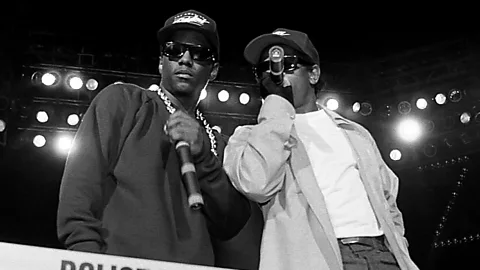'It's time to retaliate in song' – Why NWA's provocative 80s rap became an anthem
 Getty Images
Getty ImagesNWA's landmark album Straight Outta Compton was released on 8 August 1988, bringing the sound of gangsta rap to mainstream America. In History revisits an interview with the young rap crew as they tried to deal with the success and fallout of the record.
"You are now about to witness the strength of street knowledge" is the line that opens Straight Outta Compton, the title track that kicks off NWA's multi-million selling debut. It sets the scene for an hour of incendiary rhetoric and thrilling sonics, blending bravado, misogyny, homophobia, and a provocative message that travelled far beyond their home city of Compton, in South Central Los Angeles.
Warning: This article contains language that some may find offensive.
Fuck tha Police is the explicit protest song that put NWA on the map. An urgent howl of fury against police brutality and racial profiling, it led the FBI to complain to their record company that it encouraged violence and disrespect of the law. Told as a parody of court proceedings, rapper Dr Dre turns judge and hears his band mates Ice Cube, MC Ren and Eazy-E present a forceful case for the prosecution of the Los Angeles Police Department.
What follows is a rap sheet that includes police who "think they have the authority to kill a minority", cops who assume all young black men are "selling narcotics", and black officers who are just as guilty of mistreatment.
For Ice Cube, the group's initial breakout star who wrote more than half of the album's lyrics, it was a "surreal fantasy" song of revenge. He told the BBC's Late Show reporter Mary Harron: "I'm sick of getting hassled. I was tired of seeing my friends come home with scars and stuff, police beating them up for anything and everything, so I was like, 'Yo, it's time to retaliate, you know, it's time to retaliate in song'. 'Let's hurt their feelings' type of thing, you know? You can't do it physical, but we can do it on this record."
Dr Dre, the group's production mastermind, believed they were merely reporting on something that was there in plain sight. He told the programme: "Everybody's thinking the same thing but nobody has really the heart to say it, you know, and we say it. Everybody is saying 'fuck the police' but nobody's saying it to the public, and we did."
In History
In History is a series which uses the BBC's unique audio and video archive to explore historical events that still resonate today. window._taboola = window._taboola || []; _taboola.push({ mode: 'alternating-thumbnails-a', container: 'taboola-below-article', placement: 'Below Article', target_type: 'mix' });
